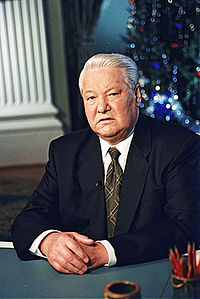Boris Yeltsin President
Boris Nikolayevich Yeltsin (/ˈjɛltsɪn/; Russian: Бори́с Никола́евич Е́льцин; IPA: [bɐˈrʲis nʲɪkɐˈlaɪvʲɪtɕ ˈjelʲtsɨn] (13px ); 1 February 1931 – 23 April 2007) was a Russian politician and the first President of the Russian Federation, serving from 1991 to 1999.Originally a supporter of Mikhail Gorbachev, Yeltsin emerged under the perestroika reforms as one of Gorbachev's most powerful political opponents. On 29 May 1990 he was elected the chairman of the Russian Supreme Soviet. On 12 June 1991 he was elected by popular vote to the newly created post of President of the Russian Soviet Federative Socialist Republic (SFSR), at that time one of the 15 constituent republics of the Soviet Union. Upon the resignation of Mikhail Gorbachev and the final dissolution of the Soviet Union on 25 December 1991, Yeltsin remained in office as the President of the Russian Federation, the USSR's successor state. Yeltsin was reelected in the 1996 election, where critics widely claimed pervasive corruption; in the second round he defeated Gennady Zyuganov from the revived Communist Party by a margin of 13%. However, Yeltsin never recovered his early popularity after a series of economic and political crises in Russia in the 1990s.He vowed to transform Russia's socialist command economy into a free market economy and implemented economic shock therapy, price liberalization and privatization programs. Due to the method of privatization, a good deal of the national wealth fell into the hands of a small group of oligarchs. While the few billionaire oligarchs likened themselves to the American "robber barons" of the nineteenth century, no real comparison can be drawn. Rather than creating new enterprises, they played the role of old state trading monopolies, arbitraging the huge difference between old domestic prices for Russian commodities and the prices prevailing on the world market.Much of the Yeltsin era was marked by widespread corruption, inflation, economic collapse and enormous political and social problems that affected Russia and the other former states of the USSR. Within the first few years of his presidency, many of Yeltsin's political supporters turned against him and Vice President Alexander Rutskoy denounced the reforms as "economic genocide".Ongoing confrontations with the Supreme Soviet climaxed in the October 1993 Russian constitutional crisis in which Yeltsin illegally ordered the dissolution of the parliament, which then attempted to remove him from office. In October 1993, troops loyal to Yeltsin stopped an armed uprising by his opponents outside of the parliament building, leading to a number of deaths. Yeltsin then scrapped the existing constitution, temporarily banned political opposition and deepened his economic experimentation. He introduced a new constitution with stronger presidential power and it was approved by referendum on 12 December 1993 with 58.5% of voters in favour.On 31 December 1999, Yeltsin made a surprise announcement of his resignation, leaving the presidency in the hands of his chosen successor, then-Prime Minister Vladimir Putin. Described by the BBC as the “flawed founder of Russian democracy”, Yeltsin left office widely unpopular with the Russian population.
Personal facts

| Alias (AKA) | Ельцин Борис Николаевич (Russian); Eltsin. |
|---|---|
| Birth date | February 01, 1931 |
| Birth name | (Борис Николаевич Ельцин) Boris Nikolayevich Yeltsin |
| Birth place | |
| Religion | |
| Date of death | April 23, 2007 |
| Place of death | |
| Education | |
| Spouse | |
| Children |
Search
Politician
| other party | |
|---|---|
| party | Independent (politician) |
| prime minister | |
| successor | |
| vice president |
Topical connections
Boris Yeltsin on Wikipedia
External resources
- http://de.scribd.com/doc/22070994/Yeltsin-s-Russia-Myths-and-Reality
- http://getdefault.com/?p=132
- http://hammernews.com/borisyeltsin.htm
- http://repository.library.georgetown.edu/handle/10822/552494/browse?type=title
- http://repository.library.georgetown.edu/handle/10822/552653
- http://vms.cc.wmich.edu/~97levintova/Ny.html
- http://www.cnn.com/SPECIALS/cold.war/kbank/profiles/yeltsin
- http://www.findagrave.com/cgi-bin/fg.cgi?page=pv&GRid=19058255&PIpi=6581646
- http://www.reason.com/news/show/120349.html